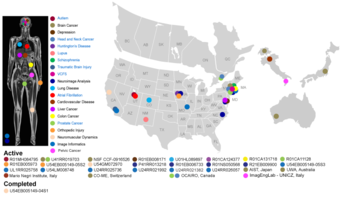Difference between revisions of "Leadership:Main"
From NAMIC Wiki
| Line 31: | Line 31: | ||
|- | |- | ||
|style="background: #ebeced"| [[image:NA-MIC-Overview-2012-11-Slide1.png|400px| NA-MIC 2012 in numbers]] | |style="background: #ebeced"| [[image:NA-MIC-Overview-2012-11-Slide1.png|400px| NA-MIC 2012 in numbers]] | ||
| − | |style="background: #ebeced"| [[image: | + | |style="background: #ebeced"| [[image:NA-MIC-Overview-2012-11-Slide2.png|400px| Traumatic Brain Injury (TBI): a DBP for Na-mic. The goal of the project is to develop quantitative measures for the prediction of outcome in patients with moderate to severe brain trauma. Clinical: UCLA, algorithm research: UTAH, UNC, Kitware, engineering: UCLA, Kitware, GE. Software platform for delivery to the community: 3D Slicer (this is going to happen during next year)]] |
|- | |- | ||
|} | |} | ||
Revision as of 11:45, 26 October 2012
Home < Leadership:MainBack to NA-MIC Cores
Introduction
|
The National Alliance for Medical Image Computing,NA-MIC, is a network of peers consisting of computer scientists, engineers and biomedical researchers. NA-MIC has multiple goals which include:
The main role of the leadership of this enterprise is to set the long term and short term goals for the Alliance. This requires close consultation and coordination with and among the participants of NA-MIC. A secondary role of the leadership core is to present NA-MIC to the outside world, including NIH, the biomedical and medical image computing communities. |
NA-MIC Activities | |
| NA-MIC is a National Alliance with funded activities in a variety of disease processes, geographic locations and, anatomic regions. | ||
Regular Meetings
- Weekly Engineering Tcons
- Monthly Algorithm Tcons
- Regular phone calls with core PI's
Ongoing Activities
- November 8-9 2012: NCBC showcase event in Washington DC
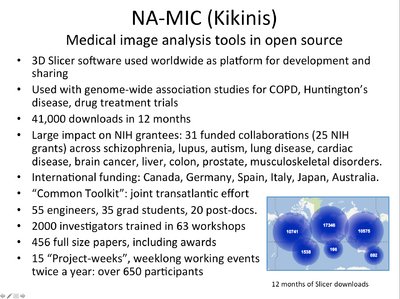
|
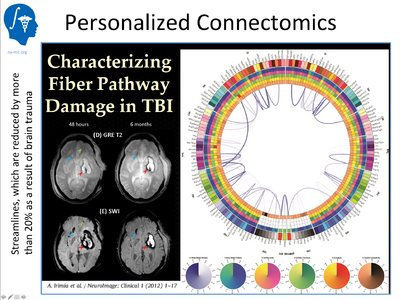
|
- September 2012: Raise the visibility of MIC: Wikipedia page, call for identifying MIC grants submitted to NIH
- August 31 2012: Tcon for planning Nov NIH event
- May 2012: Visit to Australia with presentations in Sydney, Melbourne, Perth
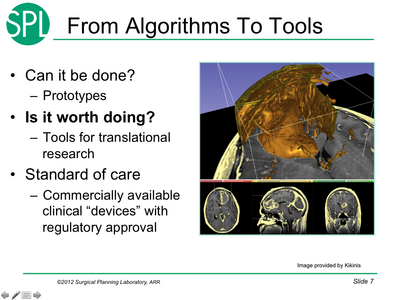
|
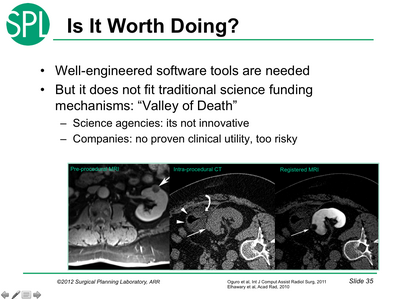
|
- November 27: Slicer 4 release at RSNA, Chicago, IL
- November 16: Opening lecture at CASEIB, Carceres, Spain
- November 06: Slicer course at AAGL, Ft. Lauderdale, FL
- October 20: Slicer 4 Documentation Sprint
- October 14-15: Algorithm Core retreat
- October 12-13: IGT workshop in Washington DC
- October 7: Presentation at UBC
- September 18: DTI challenge at Miccai
- August 24 2011: Dicom ITK discussion
- June 15 2011: Slicer Workshop at the Biomedical Imaging Research Centre at the University of Western Ontario
- May 11-12 2011: iDASH Symposium: Integrating Data for Analysis, Anonymization, and Sharing Namic presentation on day 1). The Great Hall, University of California, San Diego
- April 23-30 2011: Roadtrip in Japan.
- April 22 2011:Working meeting with the AFIB DBP in SLC.
- April 5 2011: Presentation at JHU. See here for the entire event.
- January 24 2011: Presentation at the iDASH Workshop about the secondary use of clinical images for biomedical research.
- December: Survey of IGT activities
- November 8-9: West Coast Events
- November 5-6: Algorithm Core retreat
- November 4-6: Widget Design Fiesta, Kitware South, Carborro, NC
- September 28: Visit at UCLA: preparation for DBP activities, talk
- September 23: Slicer Tutorial at Chinese PLA General Hospital in Beijing, China
- September 20: NA-MIC Tutorial at MICCAI 2010 in Beijing, China
- August 26: Planning renewal activities
- August 5: Presentation at the AKH in Vienna
- June 28 2010: Presentation at the ITK 10th Anniversary.
- April 9-10 2010: Slicer Training at the University of Iowa, Iowa City
- March 16 2010: Presentation at the Slicer training events: Tokyo Women's Medical University, Tokyo, JP
- March 15 2010: Presentations at Tokyo University, Department of Radiology, Department of Mechanical Engineering and Biomedical Engineering. See here for the presentation.
- March 11 2010: Presentation at the AMIA translational bioinformatics workshop in SF. See here for the presentation.
- March 11 2010: visit and Slicer presentation at the SF VA
- Feb 9-11 2010: Collaboration visit in SLC, Utah. Meeting with the autism and cardiac projects people.
- Feb 5 2010: Rons rules for tools
- Jan 8 2010: NA-MIC competitive renewal submitted
- October 1 2009: Lecture at MIT biomedical computing class
- October 1 2009: ARRA Supplements
- September 10 2009: Open Source Software as an Enabler of Science. Word Congress 2009 Medical Physics and Biomedical Engineering, Munich, Germany.
- June 29 2009: Presentation about 3D Slicer. Working meeting about a common toolkit.
- June 18 2009: Open Source Software as Enabler of Research. Presidential Guest Lecture at the 9th Annual Meeting of the International Society for Computer Assisted Orthopedic Surgery
- June 4 2009: Presentation at MEVIS
- May 11-12, 2009: Core 1 visit to Georgia Tech: brainstorming for competitive renewal
- May 5-4, 2009: Core 2 visit to Georgia Tech: brainstorming for competitive renewal
- February 27, 2009: Visit at NCI to explore interactions with CaBIG and the intramural animal imaging program
- October November December 2008: Multiple trips and meetings to scope out next generation DBP's
- September, 2008: MICCAI, Core 1 PI get together
- August, 2008: NCBC AHM meeting in Bethesda
- July, 2008: Planning of next generation DBPs begins
- June, 2008: Participation in the Project week
- June, 2008: Participation in the Germany outreach event
- April, 2008: Na-mic presentation at McMaster Univ.
- March 13, 2008: Visit at Allen Brain Institute, Seattle
- March 12, 2008: Visit at Intuitive in Sunnyvale
- March 09, 2008: Presentation for the AMIA Translational Bioinformatics Summit
- January 17, 2008: Visit of Georgia Tech in Jan 2008
- January 08, 2008: Slicer3 compilation discussion
- October 25, 2007: Presentation about Open Source in Robotics
- October 12, 2007: Discussion about Slicer and IGT
- October 11, 2007: The Application of Open Source Concepts to Image Guided Therapy Plenary Session talk at CURAC
- October 3, 2007: Ron Kikinis presenting at IIC, Harvard: Medical Image Computing: From Data to Understanding, Video of the presentation, PPT of the presentation
- September-01-07: Publications database introduced
- September-2007: Projects for the DBP's in 2007
- June-08-2007: Answers to the questions by the NCBC study section
- April-15-2007: ISBI Plenary Session Lecture about MIC.
- AHM 2007: Strategy Planning for competitive renewal
- November-21-2006: NA-MIC and NAC presentations at the DKFZ in Heidelberg
- October-26-2006: Visiting the MIND institute
- Sept-06-2006, 2006 IBMISPS conference: talk by R. Kikinis about FOSS
- May 5 2006: Meeting with Andy Cedilnik at 1249 Boylston to review plans for wiki based maintenance for the NA-MIC website
- April 24, 2006 The Human Brain Project: Linking Within and Beyond Natcher Conference Center, NIH Campus, Bethesda, Maryland: National Alliance for Medical Image Computing: Science & Technology of One National Center for Biomedical Computing (this is a slightly modified version of the presentation)
- April 18 2006: Scientific Visualization 2006 Workshop, University of Minnesota, Minneapolis: 3D SLICER: An Open Source Tool for Subject-Specific Data Analysis abridged presentation ppt (20MB) snapshot of the three presenters
- April 08 2006: ISBI conference SA-AM-SS1: Towards Vertical Integration of Biomedical Data presentation ppt
- March 23: TCON among Core PIs on the selection of next generation DBPs.
- March 17: TCON among Core PIs on the new format of annual scientific report by projects, not by cores.
- March 11-30, 2006: Pre-selection of next generation of NAMIC-DBPs and the phase out plan of existing ones.
- January 8-13, 2006: The second All-Hands-Meeting and Programming event in Salt Lake City, Utah
- Dec-12-2005 Start NCBC Evaluation TCON with a total of seven NCBC centers
- Nov-18-2005 Initial T-con with EAB
- Sept-Oct 2005 Closing of accounts and preparing Carryforward Request
- July 2005 External Advisory Board (EAB) is formed
- May-June 2005 Coordination with all sites to prepare the Annual Progress Report as well as Carryforward explanations.
- May-Oct 2005 Interaction with ISC (ITK Software Consortium) as well as Partners OGC (Office of General Counsel) about Slicer Licensing
- Apr 14 2005 NAMIC management "office hours"
- Apr 9 2005 Coordination of Core 3, prospective IRB issues (CAMH, UCI, and Dartmouth no need for new IRBs. VA/Harvard filing soon)
- Mar 30 2005 NAMIC accomplishment snapshot for NIH
- Feb 1-18 2005 Harvard, Dartmouth and UCI data cleaned, validated and uploaded
- Feb 7 2005 Attended NIH-NCBC Evaluation Liaisons Conference Call Meeting
- Jan 12 2005 Secondary-use IRB approved by Partners
- Dec 21 2004 Filed Secondary-use IRB for data-sharing with Partners' IRB (for use of VA/Harvard and Dartmouth data)
- Dec 17 2004 Dartmouth's Secondary-use IRB for restrospective data approved for sharing with NAMIC
- Dec 10 2004 Coordinated with MIT/VA/Harvard to start a straw-man proposal for data-sharing policy for NAMIC
- Dec 8 2004 Attend NCBC meeting in NIH
- Nov 30 2004 VA/Harvard's Secondary-use IRB for restrospective data approved for sharing with NAMIC
- Nov 20 2004 Finalized schedule for all-hand meeting on Feb 5 2004, Salt Lake City, Utah
- Nov 7 2004 Defined master project plan for NAMIC Year 1 activities and worked with Core 4 to post it on NAMIC website.
- Nov 3 2004 Identified two potential collaborative projects, one in diGeorge brain MRI imaging genome and the other in COPD lung cancer CT imaging genome with investigators from I2B2, another NCBC at Harvard.
- Oct 15 2004 Host first NAMIC kickoff meeting @ Stata Center, MIT, MA
- Oct 14 2004 Meet with NIH program managers and Art Toga--the PI of another NCBC imaging related Center--@ BWH Radiology Boylston Lab
- Oct 10 2004 Start working with all cores on the multi-institutional IRBs for NAMIC.
- Oct 5 2004 Leadership core planning on NAMIC kick-off meeting
- Oct 1 2004 Set up NAMIC emailing groups
Highlights
